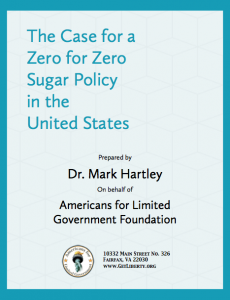By Rick Manning
The 2014 Farm Bill has finally been put to bed. One of the most contentious pieces of legislation that faces Congress every five years, the headline from this latest round in the fight against agriculture subsidies is more of the same.

Rather than bemoan this outcome and promise to refight the same arguments again in 2019, Congress should engage in some forward thinking and explore different ways to approach this seemingly intractable issue.
Representative Ted Yoho (R-FL) has introduced HCR 39 that would provide a new rational way to eliminate subsidies and price supports in the sugar industry, while protecting American cane growers from unfair foreign sugar subsidies and dumping into our market.
In simple terms, Yoho’s Zero to Zero plan, would trigger the end of all U.S. subsidies when the Executive Branch gains agreement from other sugar producing nations around the world to end their subsidies. By acting first contingent upon other nations actions, the U.S. will be taking the lead in forcing a realistic solution to this issue, allowing domestic growers to compete on an even footing with the rest of the world.
While it will be very difficult to get a World Trade Organization agreement amongst the world’s sugar producers to end farm subsidies, it makes much more sense to take this lull in our own congressional subsidy battle to take action to put this process into motion.
The truth is that other nation’s will not believe that the U.S. will take action on our own subsidy programs without the exact type of up-front action that Yoho is pushing.
And Yoho’s innovative approach can provide light on how to get out from under the subsidy programs that riddle our agriculture policy.
It would be a shame if the same tired arguments by the same actors get recited in five years, when people of good will on all sides should be able to rally behind Yoho’s bill. The worse that happens is that the Executive Branch is given marching orders to deal with subsidies as an international trade issue rather than as a domestic one, and the U.S. can lead the world as adults who have acted to end subsidies when the rest of the world joins us.
And if it can be made to work for sugar, just maybe our nation will have shown the rest of the world a pathway out of the seemingly never ending escalation of farm subsidization.
Congress needs to act now, while the ill-feeling of failure to break the domestic farm subsidy impasse is fresh and pass this third way. After all, what does our nation have to lose by trying something different, rather than rehashing stale eighty year old arguments?
The author is the vice president of public policy and communications for Americans for Limited Government.






